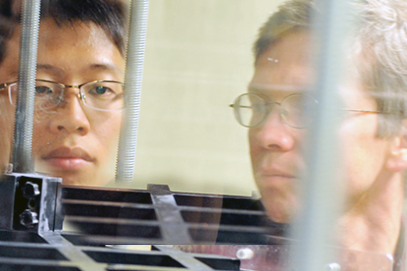New Minor in Design, Engineering and Applied Sciences Announced


Amid rising student interest, Wesleyan has announced a new interdisciplinary minor in Integrated Design, Engineering, and Applied Sciences (IDEAS), beginning in 2017-18. It will be hosted within the College of Integrative Sciences (CIS).
The IDEAS minor will introduce foundational skills in engineering and design, and bring together existing arts, design, and applied science courses to create a more formal structure to guide students interested in these fields.
According to Professor of Physics Francis Starr, a co-proposer of the minor and director of the CIS, “The new minor plays into Wesleyan’s unique capabilities and dovetails with Wesleyan’s commitment to prepare students for the challenges facing society today. Our aim is to provide students with practical design and problem solving skills, coupled with the context to understand the social and cultural implications of their work.” The minor passed the Educational Policy Committee (EPC) in April.
Wesleyan is at the forefront of an emerging approach in academia to incorporate design and engineering within a single program.
“Wesleyan is taking a bold step forward by creating a program that helps students develop a holistic view of design that includes both technical and aesthetic aspects. Rather than focusing solely on legacy disciplinary silos, students will immediately delve into the design process, integrating skills across arts and engineering,” Starr said.
The minor consists of six courses: required project-based courses in both arts and engineering, which are followed by more focused elective course modules in areas spanning arts, science and engineering. The IDEAS program will include new course offerings: CIS 170, Introduction to Engineering and Design, which is being taught for the first time this spring by Greg Voth, professor and chair of physics, professor of integrative sciences, and Principles of Engineering. Mirroring these courses, design aesthetics are examined in several courses, including ARST 190, Digital Art and ARST 233, Computer Based Modeling and Digital Fabrication. Additional courses will added in the coming year. All of these courses rely on fabrication techniques, supported in part by the Digital Design Studio.
Wesleyan has long prepared students for careers in design and engineering within the liberal arts environment through the art studio major, the urban studies course cluster, and the “3-2” or “4-2” programs, in which students receive a BA from Wesleyan and a BS in engineering from a partner institution. The minor will provide a valuable new option for students who want to pursue engineering but wish to avoid the extra year, change of institution, and additional cost involved in the dual-degree program. The minor may also be used as a step toward the dual-degree program.
“One of the reasons the new minor excites me, is that it offers a different path into engineering from our existing 3-2 program. The IDEAS minor uses hands-on fabrication to motivate learning, rather than a traditional focus on rote training,” Starr said.
The new minor was developed by a collaborative team from the Arts and Humanities Division and the Natural Sciences and Mathematics Division that includes Starr, Voth, Chris Chenier, Elijah Huge, Joseph Knee, Ellen Nerenberg and David Schorr.
“It was energizing to work with such a diverse group and envision an integrated approach to design at Wesleyan,” Starr said.
Nerenberg added, “The team is eager to broaden the scope of design in the Wesleyan curriculum to also include courses and subjects in the Social and Behavioral Sciences Division.” This will be aided by an Andrew W. Mellon funded postdoctoral fellow in design, who will work with colleagues and students across campus while teaching a variety of courses in design, as well as a professor of the practice in the College of Integrative Sciences who will teach on the engineering side for IDEAS.

